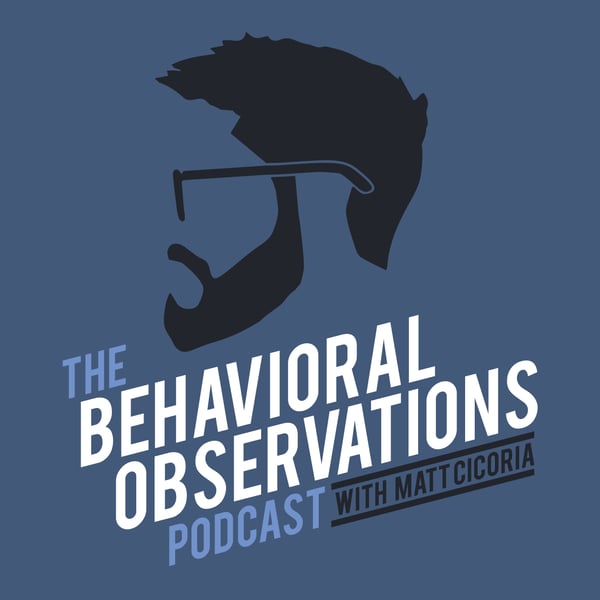Real World Functional Assessment and Treatment: Apollo CSS 2 with Jim Moore
The Behavioral Observations Podcast with Matt Cicoria
Matt Cicoria
4.8 • 648 Ratings
🗓️ 19 May 2022
⏱️ 86 minutes
🧾️ Download transcript
Summary
Oh boy, as the kids these days say, this show is a straight up banger. Dr. Jim Moore joins me again in our second installment in the Apollo Case Study Series, where we go deep into all things functional assessment.
Right out of the gate, I want to note that we do spend time reviewing both functional analysis and treatment data of clients that Jim has worked with in the past. We do the best we can to narrate the these data, but you're going to want to go to the show notes of the episode to see what we're talking about in order to get the most out of the discussion.
OK, in this episode, we discuss the following:
- How much evidence does one need in order to move forward with a behavioral intervention.
- How to assess the confidence in your functional assessment interview, and get the most out of these interactions with caregivers.
- How to train staff to be great interviewers.
- Treatment decisions based on functional assessment outcomes.
- When to use Isolated vs. Synthesized contingencies.
- How the staff at Apollo are mentored and supported in these functional assessment and treatment strategies.
This list could actually go on and on (including a sidebar about values-based care - a topic I'd like to return to at some point), so I encourage you to listen to the episode all the way through. For example, in the last moments of the show, we discussed how to navigate some of the quasi-tribal verbal behavior that comes with the functional analysis territory. You definitely don't want to miss that.
Here are some links to resources we discussed in this episode:
- The inaugural Apollo Case Study Series show where Jim discusses scientific problem-solving.
- Mueller, Sterling, and Moore (2005). Towards Developing a Classroom-Based Functional Analysis Condition to Assess Escape-to-Attention as a Variable Maintaining Problem Behavior.
- A podcast I did with longtime friend, Dr. Jim Murphy, on Motivational Interviewing.
- Forehand and Long book, as well as a podcast I did on those parenting principles with Brandon Franklin.
- Apollo Behavior's website, as well as their Facebook and LinkedIn pages.
- House, MD.
Transcript
Click on a timestamp to play from that location
| 0:00.0 | Hey, everyone. Thanks for joining me in what is now the second installment of the Apollo case study series. |
| 0:06.3 | I'm joined by Dr. Jim Moore for what is also session 189 of the behavioral observations podcast. |
| 0:13.4 | And I've been excited to share this interview with you since the moment we recorded it a few weeks ago. |
| 0:20.1 | In this interview, we go deep into all things |
| 0:22.1 | functional assessment, and from the moment you press play until it ends, I think there's |
| 0:27.4 | value in it the whole way through. I'm biased, of course, but I really hope you get as much out |
| 0:33.2 | of this discussion as I certainly did. I want to note right out of the gate that we do spend |
| 0:39.5 | some time reviewing actual data from clients that Jim's worked with. We do the best we can to |
| 0:45.2 | narrate you and walk you through these data, but let's be honest, this is a podcast, right? So |
| 0:50.3 | if you want to, you can go to behavioral observations.com. Look for the show notes for session |
| 0:55.5 | 189. And I put the graphs that we discussed right there. I should also note as an aside, |
| 1:02.0 | if you want to join the mailing list, you get the show notes sent to you a couple of days |
| 1:07.9 | after each episode goes live. So feel free to do that. |
| 1:13.4 | But what do we talk about during this show? |
| 1:16.0 | Well, we covered a whole host of things. |
| 1:18.1 | We talked about how much evidence does one really need in order to move forward with a behavioral |
| 1:23.4 | intervention, especially in the context of time-crunched behavior analysts working in insurance-funded |
| 1:31.6 | situations. We talk about how to assess the confidence in your functional assessment interview and how to |
| 1:37.7 | get the most out of these interactions with caregivers. We talk about how to train staff to be great |
| 1:43.4 | interviewers. We talk about treatment to train staff to be great interviewers. We talk about treatment |
| 1:45.3 | decisions based on functional assessment outcomes. We talk about when to use isolated versus |
| 1:50.3 | synthesized contingencies. And we talk about how the staff at Apollo are mentored and supported |
... |
Please login to see the full transcript.
Disclaimer: The podcast and artwork embedded on this page are from Matt Cicoria, and are the property of its owner and not affiliated with or endorsed by Tapesearch.
Generated transcripts are the property of Matt Cicoria and are distributed freely under the Fair Use doctrine. Transcripts generated by Tapesearch are not guaranteed to be accurate.
Copyright © Tapesearch 2025.

